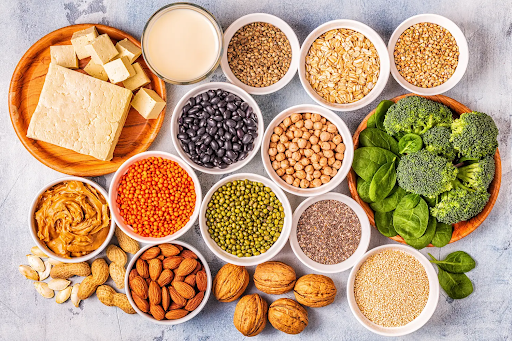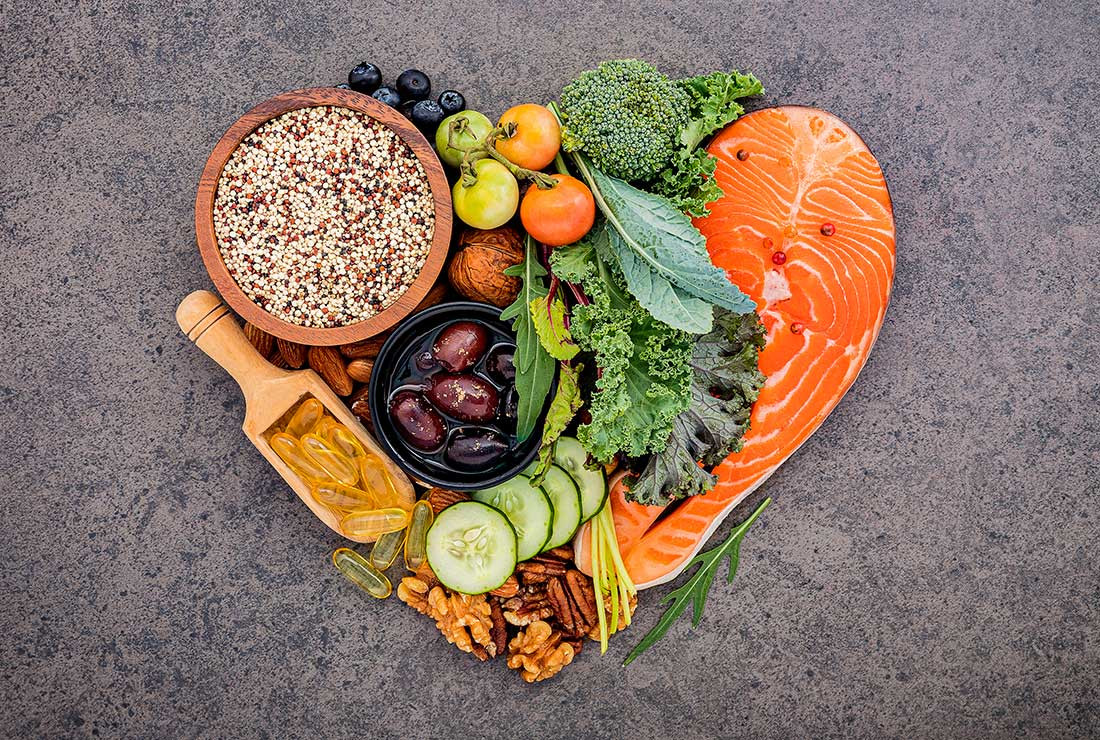Gluten Free BBQ Sauce Recipes That Even Meat-Eaters Will Love
Gluten Free BBQ Sauce Recipes That Even Meat-Eaters Will Love
Blog Article
All Concerning Healthy Food: Benefits of Embracing Plant Based Options
The conversation bordering plant-based diets has actually gained significant focus recently. Lots of people are checking out the prospective wellness benefits, dietary advantages, and environmental impacts linked with these dietary choices. As people come to be more knowledgeable about their food's influence on well-being and sustainability, questions emerge concerning the practicalities of taking on such a way of life. What certain adjustments can one anticipate, and exactly how might these selections reshape not just personal health and wellness but additionally the world's future?
Recognizing Plant-Based Diet Plans
Lots of individuals link plant-based diet plans mainly with vegetarianism or veganism, these diet regimens can incorporate a broad range of eating patterns that prioritize whole, minimally refined plant foods. Such diets commonly include fruits, vegetables, whole grains, seeds, nuts, and beans, while eliminating or restricting animal products. This flexibility permits individuals to tailor their nutritional options according to personal choices and nutritional demands. Some might embrace a primarily plant-based diet plan while still occasionally consuming meat or milk, frequently described as a flexitarian approach. The focus continues to be on integrating even more plant foods, which can result in a varied variety of dishes and flavors. Comprehending these various interpretations of plant-based eating is vital for valuing its accessibility and charm in contemporary food culture.
Health And Wellness Perks of Plant-Based Foods
The wellness advantages of plant-based foods are considerable, providing a nutrient density advantage that sustains total wellness. Study indicates that these foods can enhance heart wellness and play an essential duty in effective weight monitoring. By integrating much more plant-based options, individuals may boost their nutritional options and advertise long-lasting wellness.
Nutrient Density Benefit
Nutrient density plays a crucial role in the wellness advantages of plant-based foods, making them an engaging choice for those looking for a balanced diet plan. Plant-based foods, such as fruits, vegetables, beans, nuts, and entire grains, are typically rich in crucial vitamins, minerals, and anti-oxidants while being reduced in calories. This high nutrient density permits individuals to take in fewer calories while still meeting their nutritional requirements. Additionally, these foods are packed with dietary fiber, advertising digestion health and wellness and assisting in weight monitoring. By integrating nutrient-dense plant-based choices, customers can enhance their general wellness, support their body immune systems, and minimize the risk of persistent conditions. Ultimately, the nutrient density of plant-based foods highlights their relevance in a health-conscious way of life.
Heart Health And Wellness Improvement

Weight Administration Assistance
In addition to promoting heart health, a plant-based diet can substantially help in weight management. This dietary method highlights whole foods such as fruits, veggies, legumes, nuts, and entire grains, which are usually reduced in calories and higher in fiber compared to animal-based products. The high fiber material assists boost satiety, reducing overall calorie consumption. Moreover, plant-based diet plans are often rich in important nutrients while reduced in unhealthy fats, making it less complicated to keep a healthy weight. Plant Based Beef. Research shows that people who embrace a plant-based way of living tend to have reduced body mass indexes (BMIs) and experience even more effective weight management contrasted to those who eat meat-heavy diet plans. Consequently, embracing plant-based options is a tactical option for efficient weight management
Nutritional Value of Plant-Based Active Ingredients
Plant-based active ingredients are abundant in necessary nutrients, using a varied variety of vitamins, minerals, and antioxidants that contribute to overall health. A contrast of protein sources discloses that while animal products are usually deemed premium, several plant-based choices offer ample protein and other beneficial compounds. Recognizing the nutritional value of these ingredients can help individuals make notified dietary options.
Vital Nutrients in Plants
Nutrient-rich components found in plants provide a diverse selection of vital vitamins and minerals that contribute considerably to total health. These components are rich in vitamins A, C, and K, which sustain immune function, vision, and blood clotting, respectively. Additionally, plants offer crucial minerals such as potassium, calcium, and magnesium, vital for heart wellness, muscle feature, and bone stamina. The presence of fiber in plant-based foods aids digestion and advertises a healthy and balanced intestine microbiome. Antioxidants, found generously in vegetables and fruits, assistance battle oxidative anxiety and decrease swelling. Many plant foods are reduced in calories yet high in nutrients, making them an outstanding choice for those seeking to maintain a healthy and balanced weight while ensuring ideal nutrient intake.

Contrasting Protein Sources
Healthy protein resources differ substantially in their dietary accounts, with plant-based active ingredients offering distinct benefits. Unlike animal healthy proteins, which commonly include hydrogenated fats and cholesterol, plant proteins often tend to be reduced in these unhealthy elements. Legumes, nuts, seeds, and whole grains are abundant in necessary amino acids, fiber, vitamins, and minerals. Lentils offer high protein material along with significant iron and folate, while quinoa is a full protein, using all 9 vital amino acids. Furthermore, plant-based proteins are usually come with by anti-oxidants and phytochemicals that sustain overall wellness. The change to plant-based healthy protein resources not just boosts nutritional consumption however additionally straightens with lasting nutritional practices, decreasing environmental influence and advertising long-lasting health and wellness advantages.
Environmental Impact of Plant-Based Eating
As recognition of climate change grows, numerous people are exploring lasting dietary choices that can considerably reduce their ecological footprint. Plant-based eating has arised as a significant factor to lowering greenhouse gas discharges, which are mainly related to livestock manufacturing. The growing of fruits, vegetables, grains, and veggies generally needs less resources, such as water and land, compared to animal farming. Furthermore, plant-based diet plans can lead to reduced deforestation, as much less land is required for grazing livestock or growing pet feed. By shifting in the direction of plant-based choices, consumers can sustain biodiversity and advertise healthier ecological communities. On the whole, welcoming plant-based consuming not only advantages personal wellness however additionally represents a vital action toward environmental sustainability and preservation efforts.
Conquering Common Misconceptions
While many people identify the advantages of a plant-based diet plan, several misconceptions frequently hinder them from totally welcoming this lifestyle. A typical belief is that plant-based diet plans lack adequate healthy protein; nevertheless, many plant sources, such as legumes, nuts, and tofu, provide sufficient protein. In addition, some think that this diet plan is costly, when as a matter of fact, staples like beans, rice, and seasonal vegetables can be quite cost effective. One informative post more false impression is that plant-based consuming is extremely restrictive, whereas it actually supplies a diverse array of flavors and foods. Finally, several fret that a plant-based diet might cause deficiencies, yet check over here with correct planning, people can acquire all needed nutrients, including minerals and vitamins, while delighting in a wide array of tasty dishes.
Tips for Transitioning to a Plant-Based Way of life
Making the change to a plant-based lifestyle can be an improving experience, though it frequently calls for some guidance to navigate the first changes. People are encouraged to start slowly, integrating even more fruits, veggies, legumes, and whole grains right into their dishes while lowering meat and dairy products intake. Dish planning is important; preparing a weekly food selection can aid ease the change and avoid final harmful choices. Checking out cooking approaches and brand-new dishes can also maintain and boost the experience exhilaration concerning plant-based consuming. Additionally, joining support groups or communities can provide motivation and share important suggestions. Remaining notified regarding nutrition guarantees balanced dishes, protecting against shortages while promoting a healthy, satisfying plant-based lifestyle.

Delicious Plant-Based Dish Ideas
Checking out scrumptious plant-based meal ideas can motivate people to embrace a much more nourishing diet. One prominent alternative is a passionate quinoa salad, featuring cherry tomatoes, cucumber, and a tangy lemon-tahini clothing. An additional favorite is a tasty lentil stew, loaded with carrots, celery, and great smelling natural herbs, perfect for a soothing supper. For morning meal, over night oats made with almond milk, chia seeds, and topped with fresh berries provide a healthy begin to the day. Additionally, a vibrant vegetable stir-fry with tofu and a variety of colorful veggies can be a fast yet satisfying meal. Luscious avocado salute on whole-grain bread, sprayed with seeds and seasonings, supplies a simple yet flavorful snack. These meals display the selection and splendor of plant-based consuming.

Regularly Asked Inquiries
Can a Plant-Based Diet Provide Sufficient Protein?
The inquiry of whether a plant-based diet plan can offer sufficient protein is usual. Many sources, consisting of vegetables, nuts, seeds, and entire grains, can satisfy protein requires efficiently, sustaining a healthy and balanced diet plan for people.
Are Plant-Based Diet Plans Suitable for Children?
The viability of plant-based diet plans for youngsters depends upon mindful planning. Ample nutrients should be assured, including vitamins, minerals, and healthy proteins. With correct assistance, such diet regimens can support healthy development and development in kids.
Just how Do I Eat in restaurants on a Plant-Based Diet plan?
Eating in restaurants on a plant-based diet includes looking for restaurants with varied menus, requesting for modifications, and checking out vegan-friendly options. Planning ahead and connecting dietary preferences can improve the eating image source experience while maintaining dietary options.
What Prevail Irritants in Plant-Based Foods?
Common allergens in plant-based foods include soy, gluten, nuts, and seeds - Plant Based Beef. Individuals complying with a plant-based diet plan needs to understand these irritants and read labels thoroughly to prevent damaging responses and guarantee secure intake
Can Plant-Based Diets Assist With Weight-loss?
Research study shows that taking on a plant-based diet regimen might promote weight loss due to its usually lower calorie density and higher fiber content. This combination can enhance satiation, aiding people handle their calorie consumption successfully. Lots of individuals connect plant-based diet plans primarily with vegetarianism or veganism, these diet regimens can incorporate a vast array of consuming patterns that focus on entire, minimally refined plant foods. Nutrient density plays a vital function in the health benefits of plant-based foods, making them an engaging option for those seeking a balanced diet regimen. Plant-based diet regimens have actually been shown to considerably improve heart wellness, as they commonly consist of elements that sustain cardiovascular feature. In addition to advertising heart wellness, a plant-based diet can significantly help in weight administration. A common idea is that plant-based diet plans lack enough healthy protein; however, numerous plant resources, such as legumes, nuts, and tofu, give adequate protein.
Report this page